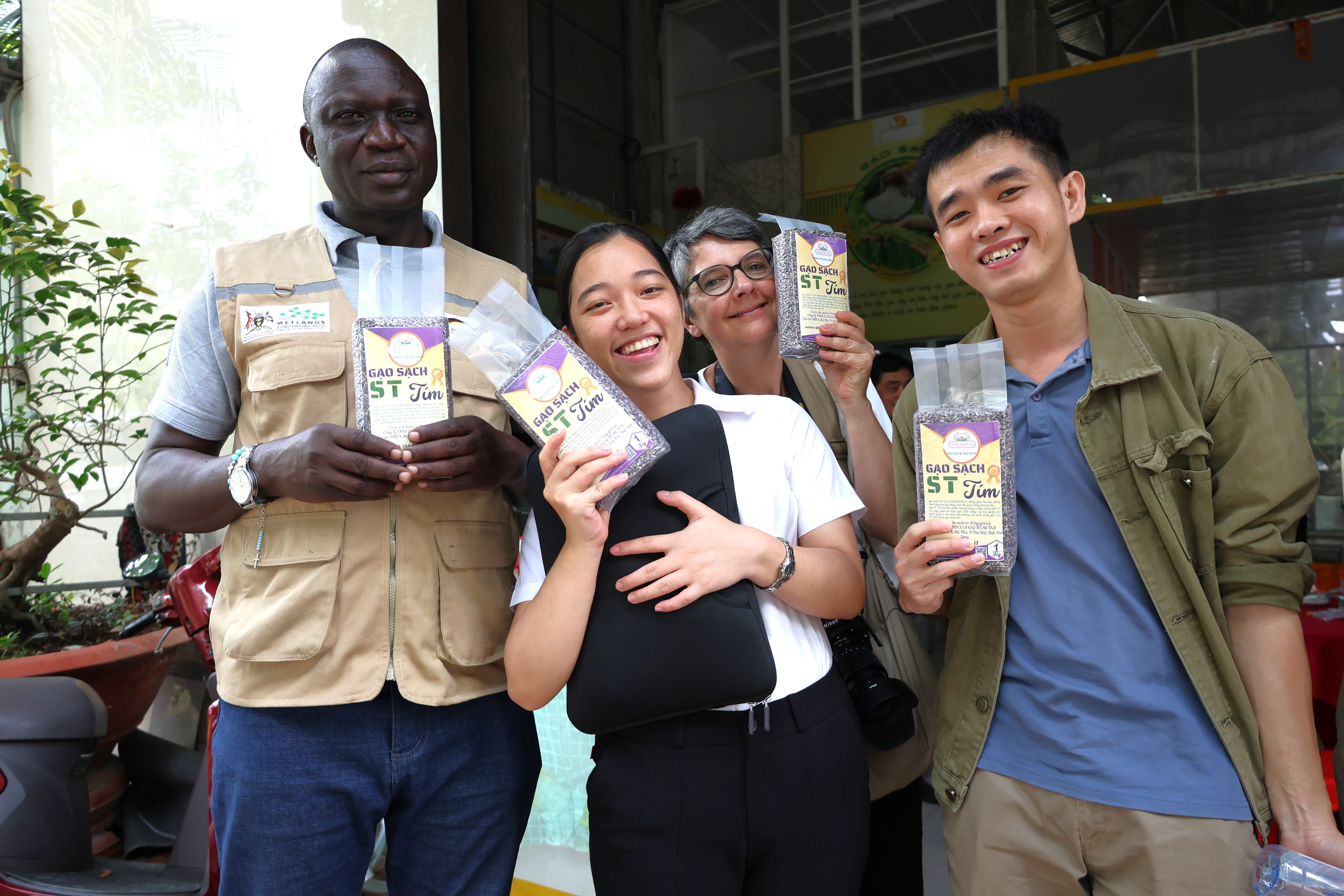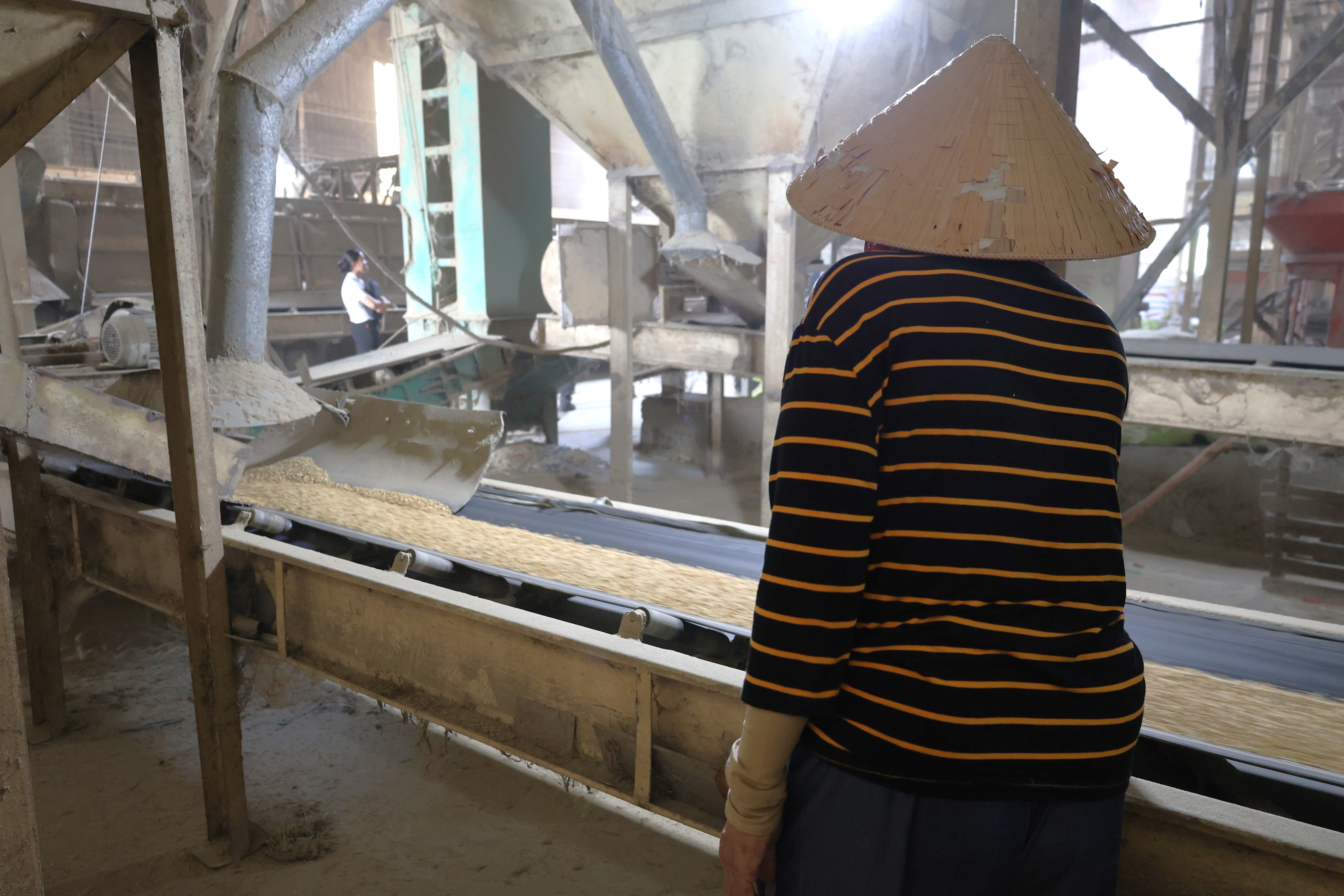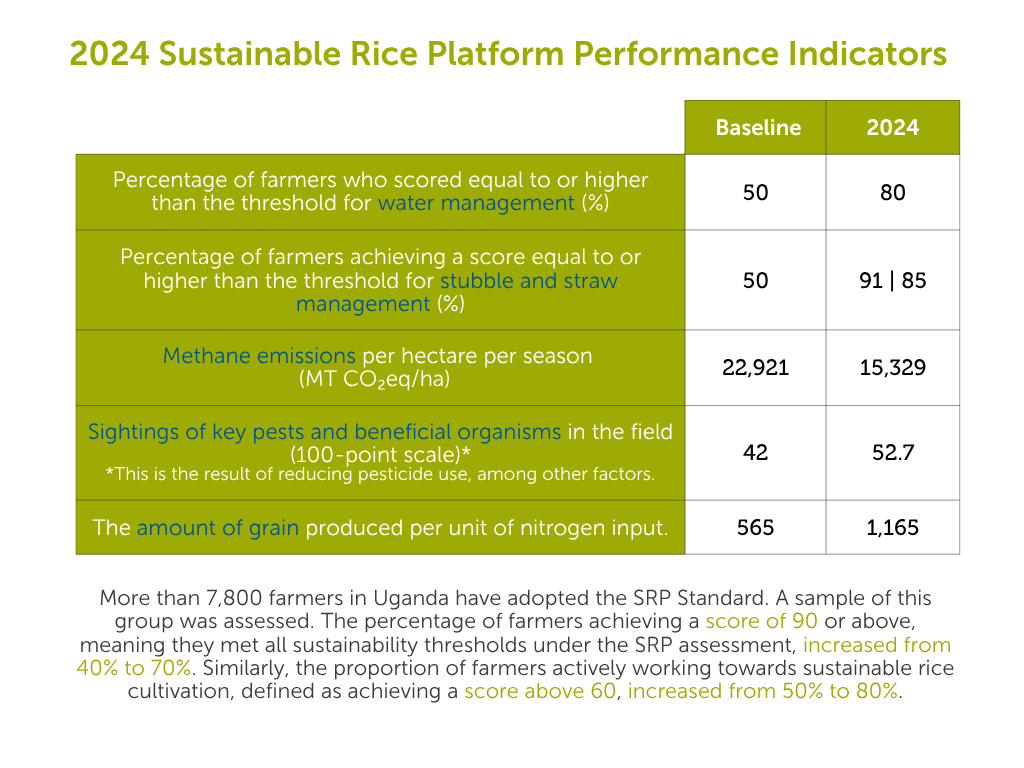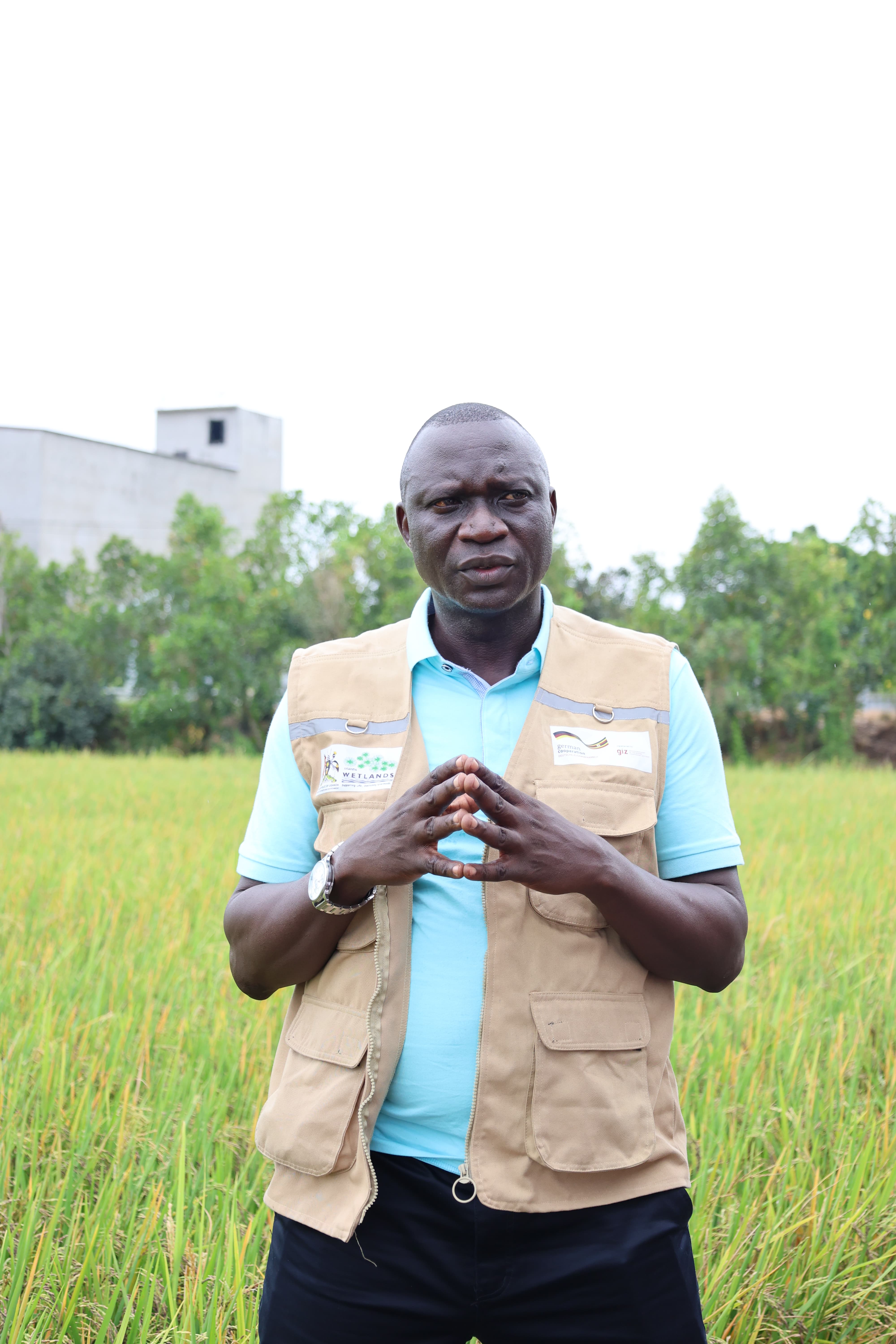In April 2025, Ugandan Commissioner for Wetlands Management David Okurut visited Vietnam, where Rikolto has been implementing sustainable rice production methods for nearly a decade. In fact, in partnership with Rikolto, as part of the Ministry of Water and Environment (MWE), his department is exploring environmentally friendly rice production models that would enable the sustainable use of Ugandan wetlands to support farmers whose livelihoods depend on rice cultivation, while preserving the ecosystem. Mr. Okurut ’s visit aimed to draw inspiration from Vietnam’s successful pilot projects in the Mekong Delta. What insights did he bring home? Keep reading.
Farmers from the Mekong Delta have faced many challenges to overcome on their path towards sustainable rice production. The rice sector in Vietnam struggles with inefficient water usage and the excessive fertilisers and pesticides use which increase production costs and affects soil fertility. Additionally, the current practice of flooding rice paddy fields creates low-oxygen conditions that allow bacteria to break down organic matter and release methane, a particularly harmful greenhouse gas. Methane accounts for only 1% of GHG emissions by weight, yet it is responsible for 50% of the global warming potential.
Due to the increasingly urgent need for re-examining and updating these rice production practices, the Sustainable Rice Platform (SRP) was adopted. The SRP is a voluntary standard and a set of indicators by which farmers who want to grow sustainable rice are measured.
To improve their SRP score, Rikolto has been supporting farmers from the Mekong Delta in adopting low-water and low-carbon rice production practices. These practices include the Alternate wetting & drying (AWD) method, which involves periodically draining the fields instead of keeping them flooded constantly. This method improves soil health and lowers methane emissions, while also helping plants access nutrients more efficiently. On top of that, the One Must, Five Reductions (1M5R) method specifies that certified seeds must be used, along with a reduction in seed density, fertiliser, pesticides, water and post-harvest losses.
Other climate-smart practices include the cultivation of mushrooms on rice straw — thus reducing waste and emissions caused by burning straw — and integrated rice-fish farming systems. These practices also help to diversify farmers’ incomes and reduces their vulnerability to crop failure and climate change.
Impressed by these sustainable production techniques, Mr. Okurut seems eager to implement similar methods in his own country: “Vietnam is known for rice production. I came here to see how they manage their water resources, their soils, and their post-harvest handling. There are some very eco-friendly agricultural activities here that I think our people could learn from.”

More than 8,000 kilometres away, rice farmers in Uganda are also navigating a complex landscape. While the specific challenges they face differ from those in Vietnam, the underlying tension is strikingly similar: how to make the most of abundant water resources without compromising the environment. Rice production in Uganda is constrained by a lack of adequate irrigation infrastructure relative to the number of smallholder rice farmers. Secondly, there has been limited focus from the Ministry of Agriculture on agro-processing. As a result, rice production remains low and cannot meet national demand.
“In Uganda, most enterprises undertaken by farmers are fruit production or horticulture.” notes David. While farmers have been encouraged to increase production, this has not been matched by sufficient market access. “People produce for the market they don't know. Now, Rikolto starts with the market, which then triggers production. This is the most sustainable way, as it ensures that what is produced meets certain standards and is intended for a specific market.”

During his visit, David Okurut attended the launch of a new project aimed at establishing a robust and sustainable supply chain for SRP-verified rice. On the one hand, there is a buyer eager to invest in transparent, traceable supply chains. On the other hand, there are farmers and processors who are committed to producing healthier rice for people and the planet and are investing their resources and energy into making this happen. With Rikolto acting as a bridge, these actors are finding ways to meet and match their goals.

The potential for a rice market in Uganda is enormous. With the right varieties — such as 90-day rice instead of the traditional six-month crops — farmers could harvest more frequently and efficiently. A strategic effort to mobilise and organise farmers to produce rice on a large scale using developed irrigation schemes could lead to a booming rice industry. The opportunity goes beyond rice, however: farmers could then also produce fish and vegetables, leading to diversified incomes and improved food security.
“Uganda has the largest water resources in the East African region, including over 80,000 wetlands and lakes, as well as an abundance of rivers. There is plenty of fresh water. Our soils are also very fertile. However, these resources remain largely untapped for irrigation purposes. Our farmers have been entirely dependent on rain-fed agriculture, which is not sustainable, so we want Rikolto to implement solutions to this.”
David Okurut
Commissioner for Wetlands Management Department of Uganda Ministry of Water and Environment
“This visit gives Rikolto a very strong entry point to collaborate closely with the Ugandan government,” says Mr. Okurut. The current policy in Uganda has farmers vacating wetlands, unlike in Vietnam where wetlands have proven to be a fertile soil for sustainable farming. Upon returning to his home country, David Okurut plans to convene a joint meeting with the Ministry of Water and Environment, the Ministry of Agriculture, the National Environmental Management Authority (NEMA) and Rikolto’s Ugandan leadership to show that “farmers can be supported to grow rice in wetlands and manage the wetlands sustainably.”
The goal: to draft a Cabinet Paper proposing a new integrated wetland management and sustainable rice farming strategy based on the use of the SRP Standard. To do so the number and acreage of farmers per region would need to be identified, starting with the three sub-regions that host major irrigation scheme. Information would also need to be collected regarding the benefits of the sustainable models being promoted. Rikolto is already building on the results of the SRP assessments and, in partnership with stakeholders such as the MWE and the Danish Embassy, aims to develop a strong evidence base demonstrating that rice farmers operating in wetland areas can earn a decent living from rice production while protecting the environment. For instance, thanks to the adoption of the SRP Standard and commercialisation of sustainable rice, the net profit margin of Rikolto-supported agribusinesses increased from 10% to 18%. The table below highlights additional improvements, specifically related to environmental sustainability.

The Ministry of Agriculture and the Ministry of Water and Environment have already agreed to support farmers in accessing resources that are necessary to expand their business. Moreover, the government of Uganda collaborates with the private sector often, which means that Mr. Okurut already has a vision for the next steps that need to be taken. “We shall provide the policy environment and the framework, the private sector will champion the process. Then the different ministries will do their role: the Minister of Agriculture will support the Minister of Water and Environment who will also support the farmgate sales. So it will be a concerted effort across ministries.”
Overall, the visit to Vietnam has left David Okurut inspired and hopeful for the future. With the number of wetlands in his country and several government initiatives promoting farming as a reliable and sustainable income source, there is certainly a lot of potential for Uganda to carve out a place in the East African market for rice.
Editor: Irene Salvi - International Communications, Rikolto

We shall provide the policy environment and the framework, the private sector will champion the process. Then the different ministries will do their role: the Minister of Agriculture will support the Minister of Water and Environment who will also support the farmgate sales. So it will be a concerted effort across ministries.